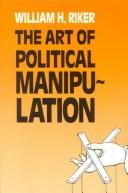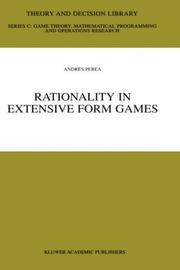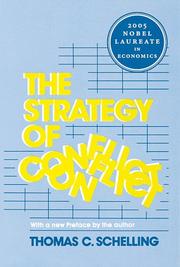| Listing 1 - 10 of 16 | << page >> |
Sort by
|
Book

ISSN: 22512071 ISBN: 1299462324 9814390704 9789814390705 9789814390699 9814390690 Year: 2013 Volume: 4 Publisher: Hackensack, New Jersey : World Scientific Pub. Co. Pte. Ltd.,
Abstract | Keywords | Export | Availability | Bookmark
 Loading...
Loading...Choose an application
- Reference Manager
- EndNote
- RefWorks (Direct export to RefWorks)
This volume collects almost two decades of joint work of Sergiu Hart and Andreu Mas-Colell on game dynamics and equilibria. The starting point was the introduction of the adaptive strategy called regret-matching, which on the one hand is simple and natural, and on the other is shown to lead to correlated equilibria. This initial finding - boundedly rational behavior that yields fully rational outcomes in the long run - generated a large body of work on the dynamics of simple adaptive strategies. In particular, a natural condition on dynamics was identified: uncoupledness, whereby decision-make
Games of strategy (Mathematics) --- Heuristic algorithms. --- Heuristics (Computer algorithms) --- Computer algorithms --- Games with rational pay-off (Mathematics) --- Rational games (Mathematics) --- Strategy, Games of (Mathematics) --- Game theory --- Group theory --- Mathematical optimization --- Matrices --- Topology --- Heuristic algorithms
Book
ISBN: 1837680604 Year: 2023 Publisher: London, England : IntechOpen,
Abstract | Keywords | Export | Availability | Bookmark
 Loading...
Loading...Choose an application
- Reference Manager
- EndNote
- RefWorks (Direct export to RefWorks)
Games both as activities and as a basic educational tool are important not only from birth to death, but also from the beginnings of human society to the present day. This book describes some modern game approaches, procedures and algorithms, as well as the practical use of game theory and its development. The discipline of game theory deals mainly with types, description, algorithmization and strategies, but also the formalization of games. Among other topics, the book discusses game classifications and formalization, cooperative and non-cooperative games, symmetric and asymmetric games, simultaneous and turn-based (sequential) games, and games with complete and incomplete information. The book also considers the testing and presentation of games, the relationship of game theory and information technologies, of strategy games and sports games, of economy and business games theory, and the educational, training and sociological impacts of gaming.
Game theory. --- Games of strategy (Mathematics) --- Games with rational pay-off (Mathematics) --- Rational games (Mathematics) --- Strategy, Games of (Mathematics) --- Game theory --- Group theory --- Mathematical optimization --- Matrices --- Topology --- Games, Theory of --- Theory of games --- Mathematical models --- Mathematics

ISBN: 0300035926 Year: 1986 Publisher: New Haven, Conn. Yale University Press
Abstract | Keywords | Export | Availability | Bookmark
 Loading...
Loading...Choose an application
- Reference Manager
- EndNote
- RefWorks (Direct export to RefWorks)
Politics --- #C9206 --- Games of strategy (Mathematics) --- Political leadership. --- Political planning. --- Games of strategy (Mathematics). --- Political leadership --- Political planning --- Games with rational pay-off (Mathematics) --- Rational games (Mathematics) --- Strategy, Games of (Mathematics) --- Planning in politics --- Public policy --- Game theory --- Group theory --- Mathematical optimization --- Matrices --- Topology --- Planning --- Policy sciences --- Politics, Practical --- Public administration --- Leadership

ISBN: 0792375408 1441949186 1475733917 9780792375401 Year: 2001 Volume: 29 Publisher: Boston Kluwer Academic
Abstract | Keywords | Export | Availability | Bookmark
 Loading...
Loading...Choose an application
- Reference Manager
- EndNote
- RefWorks (Direct export to RefWorks)
Games of strategy (Mathematics) --- Games with rational pay-off (Mathematics) --- Jeux de stratégie --- Rational games (Mathematics) --- Strategiespellen --- Strategy [Games of ] (Mathematics) --- 519.8 --- Strategy, Games of (Mathematics) --- Game theory --- Group theory --- Mathematical optimization --- Matrices --- Topology --- Operational research --- 519.8 Operational research --- Economic theory. --- Econometrics. --- Economic Theory/Quantitative Economics/Mathematical Methods. --- Economics, Mathematical --- Statistics --- Economic theory --- Political economy --- Social sciences --- Economic man
Book
ISBN: 0124023568 9786612289491 1282289497 0080955436 9780080955438 9780124023567 9781282289499 661228949X Year: 1973 Volume: 36 Publisher: New York (N.Y.): Academic press
Abstract | Keywords | Export | Availability | Bookmark
 Loading...
Loading...Choose an application
- Reference Manager
- EndNote
- RefWorks (Direct export to RefWorks)
Graphs, Dynamic Programming and Finite Games
Graph theory --- Games of strategy (Mathematics) --- Programming (Mathematics) --- 519.8 --- Operational research --- 519.8 Operational research --- Graph theory. --- Mathematical programming --- Goal programming --- Algorithms --- Functional equations --- Mathematical optimization --- Operations research --- Graphs, Theory of --- Theory of graphs --- Combinatorial analysis --- Topology --- Games with rational pay-off (Mathematics) --- Rational games (Mathematics) --- Strategy, Games of (Mathematics) --- Game theory --- Group theory --- Matrices --- Extremal problems
Book
ISBN: 1280499389 9786613594617 0262301164 9780262301169 9780262300377 0262300370 9780262016971 0262016974 9781280499388 661359461X Year: 2012 Publisher: Cambridge, Mass. MIT Press
Abstract | Keywords | Export | Availability | Bookmark
 Loading...
Loading...Choose an application
- Reference Manager
- EndNote
- RefWorks (Direct export to RefWorks)
The convergence of military strategy and mathematics in war games, from medieval to modern times.For centuries, both mathematical and military thinkers have used game-like scenarios to test their visions of mastering a complex world through symbolic operations. By the end of World War I, mathematical and military discourse in Germany simultaneously discovered the game as a productive concept. Mathematics and military strategy converged in World War II when mathematicians designed fields of operation. In this book, Philipp von Hilgers examines the theory and practice of war games through history, from the medieval game boards, captured on parchment, to the paper map exercises of the Third Reich. Von Hilgers considers how and why war games came to exist: why mathematical and military thinkers created simulations of one of the most unpredictable human activities on earth.Von Hilgers begins with the medieval rythmomachia, or Battle of Numbers, then reconstructs the ideas about war and games in the baroque period. He investigates the role of George Leopold von Reiswitz's tactical war game in nineteenth-century Prussia and describes the artifact itself: a game board-topped table with drawers for game implements. He explains Clausewitz's emphasis on the "fog of war" and the accompanying element of incalculability, examines the contributions of such thinkers as Clausewitz, Leibniz, Wittgenstein, and von Neumann, and investigates the war games of the German military between the two World Wars. Baudrillard declared this to be the age of simulacra; war games stand contrariwise as simulations that have not been subsumed in absolute virtuality.
War games --- Games of strategy (Mathematics) --- History. --- Games with rational pay-off (Mathematics) --- Rational games (Mathematics) --- Strategy, Games of (Mathematics) --- Kriegsspiel --- War --- Wargames --- Simulation games --- Military art and science --- Military maneuvers --- Tactics --- HIstory. --- Mathematical models --- Game theory --- Group theory --- Mathematical optimization --- Matrices --- Topology --- SCIENCE, TECHNOLOGY & SOCIETY/History of Technology --- SOCIAL SCIENCES/Media Studies --- SCIENCE, TECHNOLOGY & SOCIETY/History of Science

ISBN: 1281121835 9786611121839 9812770682 9789812770684 9789812706973 9789812770684 9812706976 9781281121837 6611121838 Year: 2007 Volume: 4 Publisher: Singapore ; Hackensack, NJ : World Scientific,
Abstract | Keywords | Export | Availability | Bookmark
 Loading...
Loading...Choose an application
- Reference Manager
- EndNote
- RefWorks (Direct export to RefWorks)
In 1984, Robert Axelrod published a book, relating the story of two competitions which he ran, where invited academics entered strategies for the Iterated Prisoners' Dilemma. The book, almost 20 years on, is still widely read and cited by academics and the general public. As a celebration of that landmark work, we have recreated those competitions to celebrate its 20th anniversary, by again inviting academics to submit prisoners' dilemma strategies. The first of these new competitions was run in July 2004, and the second in April 2005. Iterated Prisoners' Dilemma: 20 Years On essentially provi
Prisoner's dilemma game --- Games of strategy (Mathematics) --- Cooperativeness. --- Consensus (Social sciences) --- Authority --- Common good --- General will --- Power (Social sciences) --- Cooperation (Psychology) --- Social psychology --- Games with rational pay-off (Mathematics) --- Rational games (Mathematics) --- Strategy, Games of (Mathematics) --- Game theory --- Group theory --- Mathematical optimization --- Matrices --- Topology --- Decomposed prisoner's dilemma game --- Choice (Psychology) --- Social interaction --- Computer simulation. --- Axelrod, Robert M. --- Games of strategy --- Cooperativeness
Book
ISBN: 9781107011748 1107011744 9780511996450 9781107428980 9781139224420 9781139220996 1139220993 1139224425 0511996454 1139217917 9781139217910 1107228905 9781107228900 1280485159 9781280485152 9786613580139 6613580139 1139222716 9781139222716 1139214829 9781139214827 110742898X Year: 2012 Publisher: Cambridge Cambridge University Press
Abstract | Keywords | Export | Availability | Bookmark
 Loading...
Loading...Choose an application
- Reference Manager
- EndNote
- RefWorks (Direct export to RefWorks)
Game theory explains how to make good choices when different decision makers have conflicting interests. The classical approach assumes that decision makers are committed to making the best choices for themselves regardless of the effect on others, but such an approach is less appropriate when cooperation, compromise and negotiation are important. This book describes conditional games, a form of game theory that accommodates multiple stakeholder decision-making scenarios where cooperation and negotiation are significant issues and where notions of concordant group behavior are important. Using classical binary preference relations as a point of departure, the book extends the concept of a preference ordering that permits stakeholders to modulate their preferences as functions of the preferences of others. As these conditional preferences propagate through a group of decision makers, they create social bonds that lead to notions of group concordance. This book is intended for all students and researchers of decision theory and game theory.
Operational research. Game theory --- Decision Making --- Games of strategy (Mathematics) --- Decision making. --- Basic Sciences. Mathematics --- Applied Mathematics --- Games of strategy (Mathematics). --- Applied Mathematics. --- Decision making --- Games with rational pay-off (Mathematics) --- Rational games (Mathematics) --- Strategy, Games of (Mathematics) --- Game theory --- Group theory --- Mathematical optimization --- Matrices --- Topology --- Deciding --- Decision (Psychology) --- Decision analysis --- Decision processes --- Making decisions --- Management --- Management decisions --- Choice (Psychology) --- Problem solving --- Information Technology --- Computer Science (Hardware & Networks)

ISBN: 0674840313 9780674840317 Year: 1980 Publisher: Cambridge, Mass. Harvard University Press
Abstract | Keywords | Export | Availability | Bookmark
 Loading...
Loading...Choose an application
- Reference Manager
- EndNote
- RefWorks (Direct export to RefWorks)
Game theory --- Negotiation --- Games of strategy (Mathematics) --- 158 --- Games with rational pay-off (Mathematics) --- Rational games (Mathematics) --- Strategy, Games of (Mathematics) --- Group theory --- Mathematical optimization --- Matrices --- Topology --- Bargaining --- Dickering --- Haggling --- Higgling --- Negotiating --- Negotiations --- Discussion --- Psychology, Applied --- Games, Theory of --- Theory of games --- Mathematical models --- Mathematics --- Jeux de stratégie (Mathématiques) --- S2007412.JPG --- Internationale conflicten. Internationale spanningen. Internationale blokvorming. Veiligheidspolitiek --- 327.5 Internationale conflicten. Internationale spanningen. Internationale blokvorming. Veiligheidspolitiek --- International relations. Foreign policy --- Polemology --- 327.5 --- internationale verhoudingen --- 327 --- Conflict management
Book
ISBN: 3030244555 3030244547 Year: 2019 Publisher: Cham : Springer International Publishing : Imprint: Springer,
Abstract | Keywords | Export | Availability | Bookmark
 Loading...
Loading...Choose an application
- Reference Manager
- EndNote
- RefWorks (Direct export to RefWorks)
This book provides a state-of-the-art overview on the dynamics and coevolution in multi-level strategic interaction games. As such it summarizes the results of the European CONGAS project, which developed new mathematical models and tools for the analysis, prediction and control of dynamical processes in systems possessing a rich multi-level structure and a web of interwoven interactions among elements with autonomous decision-making capabilities. The framework is built around game theoretical concepts, in particular evolutionary and multi-resolution games, and includes also techniques drawn from graph theory, statistical mechanics, control and optimization theory. Specific attention is devoted to systems that are prone to intermittency and catastrophic events due to the effect of collective dynamics.
Games of strategy (Mathematics) --- Games with rational pay-off (Mathematics) --- Rational games (Mathematics) --- Strategy, Games of (Mathematics) --- Game theory --- Group theory --- Mathematical optimization --- Matrices --- Topology --- System theory. --- Sociophysics. --- Econophysics. --- Computational complexity. --- Game theory. --- Complex Systems. --- Data-driven Science, Modeling and Theory Building. --- Complexity. --- Game Theory. --- Games, Theory of --- Theory of games --- Mathematical models --- Mathematics --- Complexity, Computational --- Electronic data processing --- Machine theory --- Economics --- Statistical physics --- Mathematical sociology --- Systems, Theory of --- Systems science --- Science --- Statistical methods --- Philosophy
| Listing 1 - 10 of 16 | << page >> |
Sort by
|

 Search
Search Feedback
Feedback About UniCat
About UniCat  Help
Help News
News